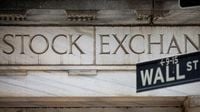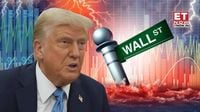The U.S. stock market experienced a catastrophic crash on April 3, 2025, as fears of a recession gripped investors following President Donald Trump's announcement of sweeping tariffs. This market turmoil resulted in significant losses for some of the world's wealthiest individuals, with the top three billionaires alone losing nearly $45 billion in net worth.
The Dow Jones Industrial Average plummeted 1,679.39 points, or 3.98%, closing at 40,545.93. The Nasdaq Composite fell 1,050.44 points, a staggering 5.97%, to end at 16,550.50, while the S&P 500 tumbled 274.45 points, or 4.84%, finishing at 5,396.52. This marked the worst single-day performance for the major indices since the pandemic began in 2020.
According to the Bloomberg Billionaires Index, Elon Musk, the world's richest individual, saw his fortune decline by $11 billion, bringing his net worth down to $322 billion. Shares of his electric vehicle company, Tesla, fell 5.47%, closing at $267.28. Meanwhile, Jeff Bezos, founder of Amazon, lost $15.9 billion as his company's stock dropped 9% to $178.41, resulting in a market capitalization of $1.89 trillion. Meta's CEO, Mark Zuckerberg, suffered a loss of $17.9 billion, with shares of Meta sliding 9% to close at $531.62, pushing the company's market cap down to $1.35 trillion.
This market crash was exacerbated by the announcement of a 10% tariff on imported goods and reciprocal tariffs on over 60 countries, including major economies like China and the European Union. Experts believe that these tariffs could disrupt global trade and unsettle businesses, leading to further economic uncertainty. James Knightley, Chief International Economist at ING, remarked, "Tariffs will put stress on U.S. consumers as prices will rise. Tariffs are 'bad news' for American consumption."
Investors reacted swiftly to the news, with major tech stocks taking a significant hit. The combined value of S&P 500 companies plummeted by $2.4 trillion, marking the largest single-day loss since the onset of the COVID-19 pandemic. The ramifications of the tariffs have raised concerns about rising inflation and declining consumer spending, as prices for goods are expected to increase.
Big banks were not spared from the fallout; Citigroup and Bank of America saw their stocks drop by about 10% each, while JPMorgan Chase & Co lost 6.3%. The market's volatility has led to speculation that the Federal Reserve may reconsider its plans for interest rate cuts, which had been anticipated earlier this year.
As the market reeled from these developments, the U.S. dollar index fell below 102, reaching a six-month low against currencies like the Japanese yen and the Swiss franc. The yield on benchmark Treasuries briefly dipped below 4% for the first time since October 2024, further indicating investor anxiety.
Market analysts are now closely monitoring the situation, with some expressing hope that negotiations could stabilize the market. Jeff Buchbinder, Chief Equity Strategist for LPL Financial, stated, "The next week will be critical as the highest tariff rates go in on April 9. Stocks should stabilize once negotiations start to bear fruit and take rates down, assuming it's clear to markets that no meaningful tariff rates will be increased further because of retaliation."
However, the potential for retaliation from other countries looms large. Countries like China and the European Union have signaled their intent to respond to the tariffs, raising fears of a broader trade war. Willem Buiter, an independent economic advisor, warned, "Emerging markets like India are at risk and will be adversely affected. The U.S. will not be a net beneficiary of the tariff war. A recession in the U.S. is unlikely, but growth may slow down. Tariffs are bad news for emerging markets."
This market crash serves as a stark reminder of the interconnectedness of global economies and the potential consequences of unilateral trade policies. As the situation develops, investors and economists alike will be watching closely to see how these tariffs impact not only the U.S. economy but also the global market landscape.
In summary, the U.S. stock market crash on April 3, 2025, highlights the fragility of economic stability in the face of aggressive trade policies. With billions lost in market value and significant impacts on major corporations and individuals alike, the economic outlook remains uncertain as the world watches for the next moves in this unfolding crisis.





